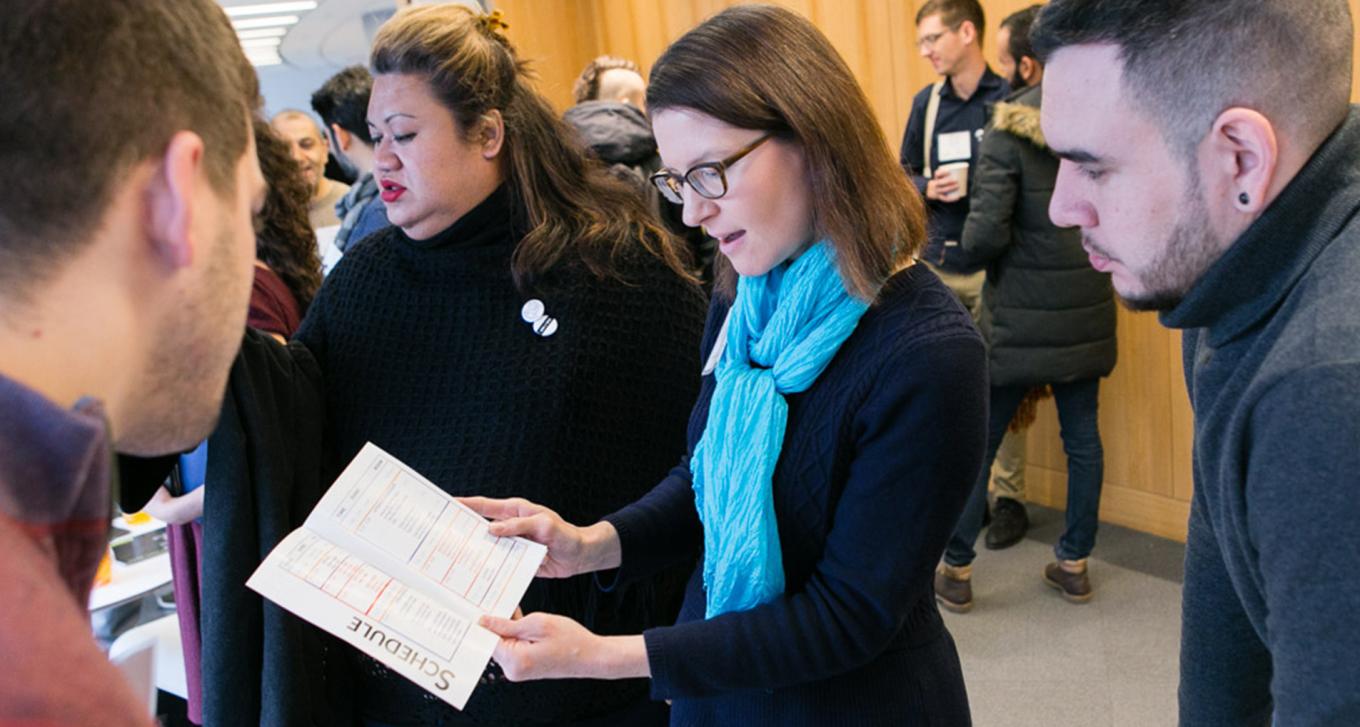
The primary goal of our online course, “Violence-free Philippines,” is to shield the LGBTIQ community from violence, abuse, and discrimination. Addressing the longstanding issue of gender-based violence (GBV) faced by the community, this course hopes to create a safer Philippine society.
The training program is aimed at bettering the lives of LGBTIQ individuals by elevating the understanding and capabilities of service providers regarding LGBTIQ issues, including sexual orientation, gender identity, expression, and human rights. It focuses on enhancing access to justice through training service providers to deliver inclusive, respectful, and appropriate services.
The online training course is composed of 10 interconnected video modules.
The modules cover the following topics:
- Introduction to the Training Course
- The Basic Concept of Human Rights
- Gender and Sexuality
- International and Philippine National Laws Related to Gender
- Gender-Based Violence and Issues faced by LGBTIQ Persons
- Remedies to Address Gender-Based Violence
- Legal Remedies to Address Gender-Based Violence
- Using Psychological First Aid (PFA) to Address Gender-Based Violence
- Affirmative Counseling to Address Gender-Based Violence
- SOGIESC-Inclusive Action Plan
The modules mix Filipino and English to maximize the learning experience. The online training sessions provide a personalized approach where participants can learn by accessing the training videos at their own pace and watching the training repeatedly of their own volition. Participants will have access to technical support and links to reading materials.
Outright International published a report documenting the experiences of lesbian, bisexual, and transgender (LBT) people in a five-country LBT Violence in Asia[1] project that includes Japan, Malaysia, Pakistan, Philippines, and Sri Lanka. The research revealed that domestic violence and family violence are consistently the most common forms of violence experienced by LBT people because of their sexual orientation, gender identity, and gender expression. Aside from providing concrete evidence of social marginalization, stigmatization, and violence experienced by LGBTIQ persons, the report also stressed how the absence of sensitive and appropriate support services, interventions, judicial recourse, legal aid, and psychotherapy support compounds the violence.
In the Philippines, domestic and family violence is the most reported form of violence among LBT people.[2 LBT activists report a “unique kind of gender-based violence, not only because LBT people are women [or are sometimes perceived to be women in the case of transgender men] but also because they defy the dictates of society.”[3] While the women’s movement has improved protections for cisgender (non-trans) heterosexual women, LBT protections remain severely lacking. Advocates identify inadequate LBT awareness and an absence of recognized protocols among first responders—including barangay (local government) officials, police, health professionals, and social workers—and mishandling of complaints by barangay and police as critical barriers to violence intervention for LBT people.
The Violence-free Philippines project is aligned with the Gender and Development Code mandated by Republic Act 9710,[4] titled “An Act Providing for the Magna Carta of Women,” which aims to improve the protection mechanism in accessing justice while strengthening the preventive mechanism against discrimination and violence.
From 2016 to 2020, Outright’s project on Addressing Domestic and Family Violence Experienced by LGBTIQ Persons in the Philippines trained 515 service providers from 119 barangays, including the Philippine National Police and Protection Centers from Quezon City and Muntinlupa City. To broaden our impact, we have designed this online course to provide convenient access for service providers and members of the LGBTIQ community across various cities in the Philippines, breaking down geographical barriers and ensuring accessibility to vital knowledge and support systems. This is particularly crucial in areas where resources may be scarce, empowering service providers and the LGBTIQ community members with the tools and understanding necessary to champion inclusivity and foster support networks.
Outright believes that skilled and educated LGBTIQ persons and service providers are essential to advance human rights for all LGBTIQ people and improve all lives.
[1] Outright International, Violence: Through the Lens of Lesbians, Bisexual Women and Trans People in Asia, 2016.
[2] Ibid.
[3] Ibid.
The Violence-Free Philippines training course is designed for all persons regardless of sexual orientation, gender identity, gender expression, sex characteristic (SOGIESC), age, disability, ethnicity, religion or spirituality, nationality, and socio-economic background.
We welcome everyone with the openness of heart and mind to learn, re-learn, and unlearn long-held concepts that limit the practice of respect and fairness.
We invite everyone who can commit to finishing the training program and developing SOGIESC-inclusive action plans for their community.
We invite everyone willing to be a force of change.
How to Join?
Register for each training program module by joining the Violence-Free Philippines online training course. To receive the training certificate, one must submit nine reflection papers and a SOGIESC-inclusive action plan at the end of the training course.
Learn About the Modules
This module explains how this project came about, the project's objectives, outlining its objectives, the specific topics covered in each training module, and the expectations and prerequisites for participants.
This module provides information on human dignity and fundamental human rights principles and characteristics.
This module provides information on various critical topics, including stereotypes, stigma, prejudice, discrimination, sexual orientation, gender identity, gender expression, and sex characteristics (SOGIESC), as well as the detrimental impact of homophobia, biphobia, intersexphobia, and transphobia. By exploring these interconnected concepts, participants will deepen their understanding of societal attitudes and biases, empowering them to challenge harmful stereotypes and advocate for inclusivity and acceptance within their communities.
This module offers information on international and national laws concerning LGBTIQ rights. Participants will gain insights into the legal frameworks established at both international and domestic levels to protect and promote the rights of the LGBTIQ community. By examining relevant statutes, treaties, and case law, participants will develop a nuanced understanding of the legal landscape surrounding LGBTIQ rights, empowering them to advocate for legislative change and uphold the rights and dignity of all individuals.
This module presents the multifaceted issues of violence, abuse, and discrimination experienced by individuals within the LGBTIQ community. Participants will explore various forms of violence, including domestic, family, and online violence, through both theoretical frameworks and real-world examples. By comprehensively examining these challenges, participants will develop a deeper awareness of the intersecting factors contributing to violence and discrimination, equipping them with the knowledge and empathy needed to advocate for systemic change and support survivors.
This module covers information to equip service providers with the necessary tools and knowledge to provide SOGIESC-inclusive remedies, including practical guidelines for intervention, effective interview techniques, and strategies to address and prevent offline and online gender-based violence. The module aims to enhance the ability of service providers to offer compassionate and effective support, ensuring that services are inclusive, responsive, and appropriate to meet the diverse needs of all individuals regardless of their sexual orientation, gender identity, gender expression, and sex characteristics (SOGIESC).
This module provides information on accessing legal remedies for everyone, regardless of their SOGIESC, who experience violence, abuse, and discrimination. Participants will learn about gender-based related laws to address these issues effectively. The module also provides practical information on where and how to access LGBTIQ-inclusive support services throughout the Philippines. The module aims to ensure that individuals facing such challenges can navigate legal avenues and access vital support resources to safeguard their rights and well-being.
This module seeks to foster resilience and promote mental health awareness by providing information on the unique risk factors for mental health issues commonly experienced by individuals within the LGBTIQ community. Participants will also explore the harmful effects of so-called conversion therapies, gaining an understanding of their impact on mental well-being. Furthermore, the module offers practical guidance on applying Psychological First Aid (PFA) in the context of the Philippines, empowering participants to provide compassionate and culturally sensitive support to those in psychological distress.
This module emphasizes the significance of affirmative counseling in supporting individuals within the LGBTIQ community. Participants will explore the principles and techniques of affirmative counseling, learning how to create a safe and inclusive environment that validates diverse identities and experiences. Through practical guidance and interactive exercises, participants will develop the skills to offer affirming and culturally competent counseling services to LGBTIQ individuals to foster trust, empowerment, and well-being.
This module covers how to prevent and monitor GBV victim-survivors, the responsibilities of an LGBTIQ-inclusive Gender and Development team, and how to draft LGBTIQ-inclusive Gender and Development action plans.
This module is dedicated to equipping participants with the knowledge and skills necessary to prevent and monitor gender-based violence among victim-survivors regardless of one’s SOGIESC. It outlines the responsibilities of a Gender and Development team and guides in drafting a SOGIESC-inclusive action plan.
This protocol acts as a toolkit for participants where topics covered in each training module are discussed thoroughly.
This video is about the Gender-based project on addressing domestic and family violence experienced by LGBTIQ persons in the Philippines implemented in Quezon City and Muntinlupa City. The video includes information about the project's objectives, the training provided, and the impact shared by project beneficiaries from the two cities.
This video serves as an introduction to our online training course. It covers the inception of the project, its impact on partner cities, project objectives, module topics, and details on how to initiate a partnership and access the training.

Explore Our Research
Our reports on global threats and opportunities confronting our LGBTIQ communities share research on urgent, relevant issues.
Read More